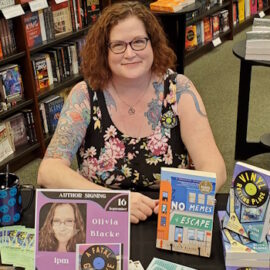
I’m no expert, and in fact I struggle to write a Synopsis every time, so I decided to do a little research and see if it would help me. Lo and behold, it did! So I decided to share what I’ve learned.
First and foremost, WHAT IS A SYNOPSIS? A Synopsis is different than a Query or Pitch. A Query (further explored here: QUERYING TIPS) is a letter an author writes to try to attract an agent or publisher. Along with the intro and technical details about the work, a Query should also include the Pitch, which is essentially the cover blurb for a novel. (For more pitchin’ love, check out Gareth L Powell‘s formula for the perfect Pitch!)
A Synopsis is a complete outline of your book, warts and all, including spoilers, plot twists, and the conclusion. It is detailed (but not too detailed). Whereas a Pitch should be 2-3 paragraphs, a Synopsis should be 2-3 pages.
From Tara Neilson @neilson_tara
#writingtip After reading a ton about how to write a synopsis, here’s what it boiled down to: Don’t write a synopsis like an Amazon spoiler free book review. Write it like a product placement review. Highlight all the selling (plot) points, including the ending. #WritingCommunity
There are lots of amazing resources dedicated to killing the Query, but many times, an agent or editor will request a Synopsis too, and there isn’t nearly as much information out there on how to write a good Synopsis.
(Here’s one such great resource: http://www.publishingcrawl.com/2012/04/17/how-to-write-a-1-page-synopsis/)
Below is an example comparing a Pitch to the beginning of a Synopsis to demonstrate how they might differ in level of detail. Note that the points covered in the Synopsis should be significant to the plot or theme – they should be interesting enough to grab attention but also relevant to later scenes and the ultimate conclusion. Which, and I cannot stress this enough, the conclusion – spoilers and all – need to be included in the Synopsis.
| PITCH (Complete) | SYNOPSIS (Excerpt) |
| In PUDDLES OF MERMAIDS, Janet Landwalker falls overboard from a party boat only to narrowly escape drowning when she is rescued by a terrifying mermaid who returns her to her home on the condition that Janet will track down the mermaid’s greatest enemy and lure him to the sea. When she finds out that the mermaid’s enemy is her own cousin, Janet begins to wonder if everything is as it seems. Now she must choose between sacrificing her cousin’s life and never stepping foot near the water’s edge again. Will she fulfill the bargain she made with the mermaid, or is her bond with her cousin strong enough to break her oath? |
In PUDDLES OF MERMAIDS, Janet Landwalker is invited aboard a party boat by her cousin Jean and her friends, but overhears someone plotting to destroy a hidden underwater kingdom. Janet doesn’t see the speaker, but she’s fairly certain she recognizes the voice of her cousin. One of the party goers catches her eavesdropping and the next thing she knows, she is bring hoisted over the railing into the dark, churning waters of the Seattle Sound. Stunned by the cold, Janet sinks towards the ocean depths only to feel strong arms wrapping around her as she is towed toward the surface. Once she catches a breath of salty air, she turns to face her savior to find herself staring into the enormous alien eyes of a mermaid… …Janet is torn between family loyalty to her cousin Jean, even though she uncovered the truth that Jean was harvesting the scales of imprisoned mermaid children for her evil Etsy project, thus endangering the while colony. Eventually, she makes the difficult decision to honor her promise to the mermaids by releasing the captive children, and then delivers Jean to the mermaid king for the ultimate justice. |
Some people call a Pitch an “elevator speech” – or how you would describe your book in a thirty second elevator ride with a stranger. In comparison, a Synopsis would be a long phone call with your bestie where you tell all.
A Synopsis should be written in a straight-forward manner with enough detail to explain what’s going on (plot, but also conflicts, emotions, and relationships) but not so much detail that every scene is described blow-by-blow. You don’t need to include subplots or action that gets the MC from Point A to Point B without revealing anything. For example, if your MC goes to the diner for lunch because they’re hungry, you can leave that out. But if while they’re at the diner, they overhear a critical piece of information, include it.
As a rule of thumb, there should be 1-2 sentences to describe the action in each chapter, with a little more for the opening and conclusion. Major characters should be introduced – if they are relevant to the plot. Tell action in order, even if it is revealed in flashbacks.
HELPFUL HINT: If you’re writing the Synopsis after writing the book, go through and write a sentence or two that sums up each chapter. What happened? What changed? How is your MC closer/further to/from their goal? What did your MC learn? Then string all those sentences together and see how they fit together in a narrative.
Like a Pitch, the Synopsis should be written in third person present tense, even if the book is not. It should reflect your voice without beating them over the head with it – IE if your book is funny, your synopsis should be too.
You don’t have to spell out: “The theme of the book is…” but it helps to highlight the theme. So, in this example, “PUDDLES OF MERMAIDS explores how family ties can go against an individual’s personal beliefs, and how conflicting obligations can strain personal relationships.” A theme statement should go near the beginning, and then have some supporting actions sprinkled though out the Synopsis.
Yes, spill the beans, including how the plot is resolved.
Finally, have someone (a trusted partner) read the Synopsis before you send it. If they have questions or concerns, resolve them! What’s the point in asking for advice if you won’t take it? As with writing in general, be open to criticism and suggestions that will improve your work (but you don’t have to take every suggestion!) and submit the best writing that you can.
And lastly, spellcheck. And hydrate.
#TheWriteLife #OliviaBlacke



